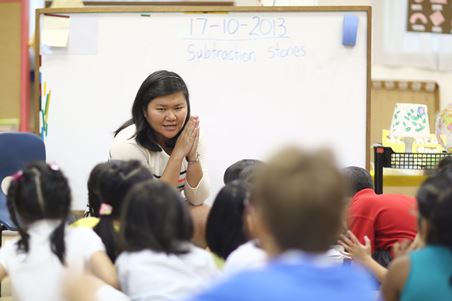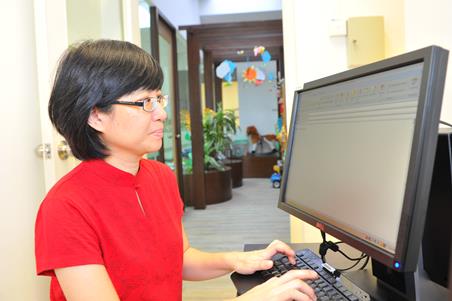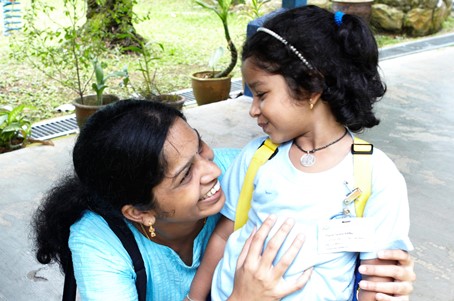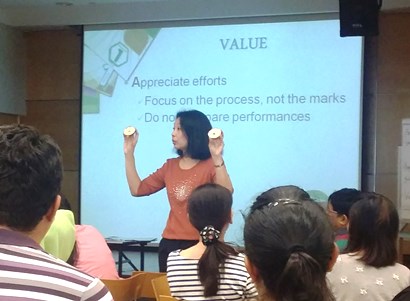First Class

A child entering school marks a new stage for the family in many ways. While many parents look forward to it as the time when they regain some "independence" with little ones out of their hands, it is also a time for anxiety: will I be able to handle the responsibility of helping my child with his school work? How can I help my child adapt to a new environment? Such are some of the common challenges parents face when children enter primary school.
What some parents do not realise is that children too experience anxiety prior to starting school. As carefree as they may be, young children are not impervious to stress brought about by change. This is experienced not just by a child attending school for the first time and facing a dramatic change in environment compared to the reassuring comfort of home. Even children who have attended pre-school classes and kindergarten prior to primary school can find adapting to a new environment and new routines a challenging affair.

The worries a child experiences stems from the fear of the unknown, say Mrs Jenny Yeo, Lead Associate (Partnerships & Engagement) of the Engagement and Research Division in the Communications and Engagement Group at the Ministry of Education (MOE). This can come from many directions: a new school means new teachers, new friends, new arrangements for getting to and from school. Primary school also signals the start of formal education -- which can be a huge departure from playschool or anything the child has ever experienced. Thus, some children will also worry about their ability to cope with learning.
It is important for a parent to prepare a child for his transition into a new phase of his life. Apart from listening to your child to understand his anxieties, preparing the child means giving him a better understanding of what he will be experiencing prior to commencement of school.
Here is advice from Mrs Yeo for helping young children make a smoother and more confident transition to primary one.
SHARE INFORMATION ON THE NEW SCHOOL
Begin by visiting the school website to gather information about the school your child will be attending. Take the time to share pertinent details about the school with the child so that he can paint a better picture of it in his head.

It is also important to describe the fundamental framework of school life: that it will be a larger learning environment with more students and teachers, and that the child will be in school for longer hours.
Talk to him too about the differences between formal education in primary school and what he might have experienced at home or in pre-school, such as how there would be structured timetables and schedules to follow, as well as certain expectations such as preparing for English and Mother Tongue spelling every week.
GET FAMILIARISED WITH SCHOOL RULES AND ROUTINES
Go on to describe what a school day in a primary school is like, such as how the day begins with the flag raising ceremony where all children gather to sing the National Anthem, to be followed by classes punctuated by recess time, and when dismissal time will be. This allows the child to mentally run through a day in primary school in his head, almost like a story that he is reading.
.jpg?sfvrsn=46546f76_0)
Also discuss school rules and regulations - such as no eating in class, keeping quiet when the teacher is speaking and obeying instructions. While some parents might think that going through school rules might intimidate the child, doing so will also allow him to better understand what the behaviour expected of him in his new environment will be.
BE POSITIVE AND EXCITED
Excite your child about this impending new experience of going to primary school - this is one of the more important things a parent should do, according to Mrs Yeo. Indeed there are many things to look forward to!

Highlight areas that resonate with your child's interests: pictures of the school's large soccer field or cultural performances put up by the pupils might get a sporty boy or a budding ballerina excited, as the prospect of making new friends or doing new things is often a happy though for children.
PREPARATION FOR BOTH PARENT AND CHILD
Good preparation is a battle half won, but do not neglect the importance of the first day in school either. "It's good to take leave from work on the first day of school to settle your child in school, even if your child is very independent," says Mrs Yeo. She recommends giving clear instructions as to where you will be at recess to watch him from afar, and when it is time to fetch him home so that the child can be reassured by the visible presence of his parent. It is also important to give the child space so that he experiences this new phase of independence.
"Stand at a distance to see your child being helped by buddies in school to buy food during recess time," says Mrs Yeo. "Trust the school to manage this well and it is best for your child to learn from his or her schoolmates."
Mrs Yeo also recommends attending any talks and workshops organised by the school during the first few days of school as these will give parents a better understanding of how they can support their child. But no number of workshops will help until you listen to your child and understand what is on his mind: for example, you may think that a child is having trouble coping with his homework when he is actually frustrated over not having his friends in his class.

"Do spend time talking to your child about his or her first few weeks in school. Some children would be more anxious than others," says Mrs Yeo. And indeed, sometimes the best way to prepare a child for anything is to talk to them, listen to their worries and fears so that you can guide them through the challenges they face, no matter how big or small.
You may also like

From Cabin to Classroom: Journey of an Outstanding Early Childhood Educator
The PDP modules allowed me to get creative with lesson ideas and keep up with the ever-changing Early Childhood sector.

Ms Farhana Binte Mohamed Hassan
Early Years Educator - PCF Sparkletots @ Pioneer Block 987D (CC)

More Than Just a Place for Food
Young children are highly inquisitive, and learn most effectively with activities that allow exploration and experimentation.

Kinderland @ Yio Chu Kang

Little Fingers Create Great Art - A Community Project by Kinderland and Skool4kidz
I believe this collaborative effort is a very meaningful contribution to the SG50 celebrations.

Kinderland and Skool4Kidz